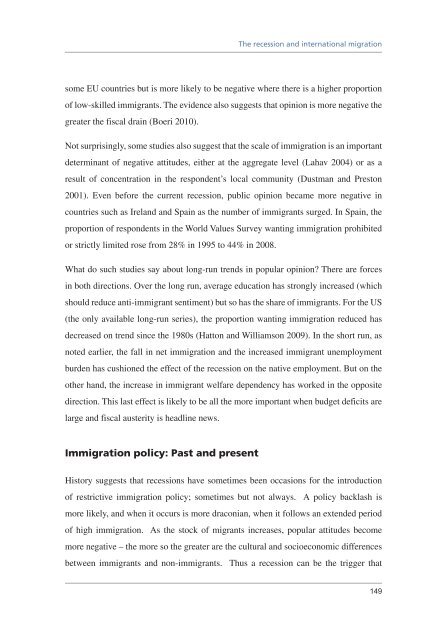Download PDF - Vox
Download PDF - Vox
Download PDF - Vox
- No tags were found...
Create successful ePaper yourself
Turn your PDF publications into a flip-book with our unique Google optimized e-Paper software.
The recession and international migrationsome EU countries but is more likely to be negative where there is a higher proportionof low-skilled immigrants. The evidence also suggests that opinion is more negative thegreater the fiscal drain (Boeri 2010).Not surprisingly, some studies also suggest that the scale of immigration is an importantdeterminant of negative attitudes, either at the aggregate level (Lahav 2004) or as aresult of concentration in the respondent’s local community (Dustman and Preston2001). Even before the current recession, public opinion became more negative incountries such as Ireland and Spain as the number of immigrants surged. In Spain, theproportion of respondents in the World Values Survey wanting immigration prohibitedor strictly limited rose from 28% in 1995 to 44% in 2008.What do such studies say about long-run trends in popular opinion? There are forcesin both directions. Over the long run, average education has strongly increased (whichshould reduce anti-immigrant sentiment) but so has the share of immigrants. For the US(the only available long-run series), the proportion wanting immigration reduced hasdecreased on trend since the 1980s (Hatton and Williamson 2009). In the short run, asnoted earlier, the fall in net immigration and the increased immigrant unemploymentburden has cushioned the effect of the recession on the native employment. But on theother hand, the increase in immigrant welfare dependency has worked in the oppositedirection. This last effect is likely to be all the more important when budget deficits arelarge and fiscal austerity is headline news.Immigration policy: Past and presentHistory suggests that recessions have sometimes been occasions for the introductionof restrictive immigration policy; sometimes but not always. A policy backlash ismore likely, and when it occurs is more draconian, when it follows an extended periodof high immigration. As the stock of migrants increases, popular attitudes becomemore negative – the more so the greater are the cultural and socioeconomic differencesbetween immigrants and non-immigrants. Thus a recession can be the trigger that149














